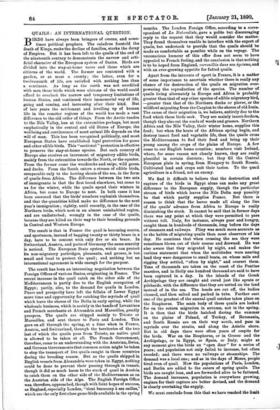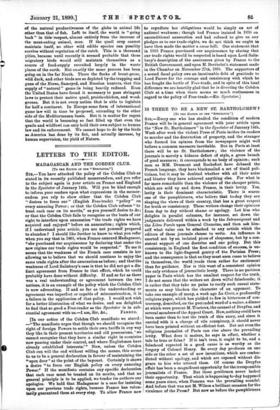QUAILS : AN INTERNATIONAL QUESTION.
BIRDS have always been bringers of omens, and some- times political prophets. The caladrus foretold the death of Kings, rooks the decline of families, storks the decay of Empires. But it has been left to the quails of the end of the nineteenth century to demonstrate the narrow and arti- ficial character of the European system of States. Birds are divided into the stay-at-home races and those which are citizens of the world. The former are contented with a garden, or at most a county ; the latter, even for a twelvemonth of life, are satisfied with nothing less than a continent. As long as the earth was not overfilled with men those birds which were citizens of the world could afford to overlook the narrow and temporary limitations of human States, and continued their immemorial way of life, going and coming, and increasing after their kind. But of late years the settlement and levelling up of human life in the remoter regions of the world has made a vast difference to the old order of things. From the Arctic tundra to the Nile Valley, less at the extremities perhaps, but most emphatically in the central and old States of Europe, the wellbeing and continuance of most animal life depends on the will of man. This has been recognised politically, and most European States have established legal protection for game and other edible birds. This "sectional " protection is effective to preserve the stay-at-home species. But each country of Europe also receives an increment of migratory edible birds, mainly from the extremities towards the North, or the equator. From the former come the woodcocks and snipe, wild geese, and clacks. From the South enters a stream of edible birds, comparable only to the herring shoals of the sea, in the form of quails from Africa. The difference between the two sets of immigrants is that the first breed elsewhere, but come to us for the winter, while the quails spend their winters in Africa, but come to Europe to nest. In both cases it has been assumed that the birds' numbers replenish themselves, and that the quantities killed make no difference to the next year's immigration ; rightly, until recently, in the case of the Northern birds, which nest in an almost uninhabited region, and are undisturbed; wrongly in the ease of the quails, because they are killed on their way to their breeding grounds in Central and Western Europe.
The result is that in France the quail is becoming scarce, and sportsmen, instead of bagging twenty or thirty brace in a day, have to be content with only five or six brace. In Switzerland, Austria, and parts of Germany the same scarcity is noticed. The European State system, which can protect its non-migratory partridges, pheasants, and grouse, is too small and local to protect the quail ; and nothing but an international agreement is wide enough for the purpose.
The result has been an interesting negotiation between the Foreign Offices of various States, originating in France. The recent increase in the quail catch on the other side of the Mediterranean is partly due to the English occupation of Egypt; partly, also, to the demand for quails in London. Peace and prosperity have left the fellahs of Lower Egypt more time and opportunity for catching the myriads of quail which leave the shores of the Delta in early spring, while the wholesale business, which is mainly in the hands of Levantines and French merchants at Alexandria and Marseilles, greatly prospers. The quails are shipped mainly to Trieste or Marseilles, and sent thence to Paris and London. This goes on all through the spring, at a time when in France, Austria, and Switzerland, through the territories of the two last of which the quails pass from Trieste, no native quail is allowed to be taken at all. The French Government, therefore, came to an understanding with the Austrian, Swiss, and German Governments that common action might be taken to stop the transport of live quails caught in those countries during the breeding season. But as the quails shipped in English vessels from Alexandria were taken in Egypt, nothing could be done to prevent their passing through in transit, though it did as much harm to the stock of quail in Austria to catch them on the other side of the Mediterranean as on the Austrian side of the Alps. The English Foreign Office was, therefore, approached, though with faint hopes of success, as England, especially London, "tient beaucoup >L sea cailles," which are the only first-class game-birds available in the spring
months. The Loudon Foreign Office, according to a corre- spondent of La Naturalists, gave a polite but discouraging reply to the request that they would consider the matter. They found themselves unable to interfere with the export of quails, but undertook to provide that the quails should be made as comfortable as possible while on the voyage. The unconscious humour of this offer does not seem to have appealed to French feeling, and the conclusion is that nothing is to be hoped from England, rerrouilles dans son egoism, and with an ever-growing appetite for fatted quails.
Apart from the interests of sport in France, it is a matter of some importance to ascertain whether there is really any chance of the destruction of the quails on migration over- powering the reproduction of the species. The number of quails living alternately in Europe and Africa is probably greater than that of any other species of edible migratory bird, —greater than that of the Northern ducks or plover, or the wildfowl migrating from the Caspian to the shores of old Ionia. The cause of their migration is, we believe, entirely due to the food which these birds seek. They are mainly insect-feeders, though they also eat the seeds of weeds and grasses. Northern Africa and the Nile Valley, their winter home, supplies this food ; bat when the heats of the African spring begin, and destroy insect food and vegetable life, then the quails cross the Mediterranean to find their food and bring up their young among the crops of the plains of Europe. A few come to our English home counties; numbers visit Ireland, where, for some reason not clearly known, they are really plentiful in certain districts ; but they fill the Central European plain in spring, from Hungary to South Russia. Cultivated land and crops snit their tastes. To the quail agriculture is a friend, not an enemy.
We find it difficult to believe that the destruction and capture of the birds in Egypt alone can make any great difference to the European supply, though the particular stream of birds which leaves the Nile Delta may possibly be that which partly supplies France. But there is reason to think that the havoc made all along the line of the quails' advance from Africa to Europe ie really diminishing the stock. It cannot be said that in former days there was any point at which they were permitted to pass without toll. Italy, for instance, always poor and hungry, caught them in hundreds of thousands, long before the days of steamers and railways. Pliny was much more accurate as to the habits of migrating quails than most observers of his day. He mentions that when crossing the sea they were sometimes blown out of their course and drowned. He was also aware that they migrated by night, and makes the curious statement that when the multitudes were nearing land they were dangerous to small boats, on whose sails and rigging they settled, "often by night," and overset them. Tens of thousands are taken on the coast of the Pontine marshes, and in Sicily one hundred thousand are said to have been captured in a day. In the islands of the Greek Archipelago they are caught and cured just like sprats or pilchards, with the difference that they are netted on the land instead of in the sea. The heads are cut off, the bodies cleaned, and then salted and packed in tubs. Farther east one of the greatest of the annual quail catches takes place on the Bosphorus. The main body of these quails are looked for on the return migration in autumn, not in the spring. It is then that the birds hatched during the summer on the plains of Poland, of Turkey, of Roumania, and South Russia are on their way south, and pass in myriads over the straits, and along the Asiatic shore. But in old days there were often years of respite for the birds. War on the Bosphorus, or in Greece and the Archipelago, or in Egypt, or Spain, or Italy, might at any moment give the birds an "open door" for a series of years; and population not only failed to increase, but often receded; and there were no railways or steamships. The demand was a local one; and as in the days of Moses, people tired even of quail. Now the populations of Paris, London, and Berlin are added to the eaters of spring quails. The
birds are caught lean, and are forwarded alive to be fattened. The demand increases, population is everywhere growing, engines for their capture are better devised, and the demand is clearly overtaking the supply.
We must conclude from this that we have reached the limit of the natural productiveness of the globe in animal life other than that of fish. Left to itself, the world is " going back" in this-respect, almost entirely from the increase of the meat-eating animal, man. If the quail crop cannot maintain itself, no other wild edible species can possibly survive without regulation of the catch. This is a thousand pities, because until recently it seemed probable that these migratory birds would still maintain themselves as a source of food-supply recruited largely in the waste places of the earth. Bat exactly the same process has been going on in the far North. There the flocks of brent-geese, wild duck, and other birds are so depleted by the trapping and guns of the Norse, Samoyed, and Russian hunters, that this supply of "natural" game its being heavily reduced. Even the United States have found it necessary to pass stringent laws to protect their native quail, prairie-chicken, and wood- grouse. Bat it is not every nation that is able to legislate for half a continent. In Europe some form of international game law will in time be proposed, extending to the other side of the Mediterranean basin. But it is matter for regret that the world is becoming so fast filled up that even the quails and wildfowl can only hold their own subject to human law and its enforcement. We cannot hope to do by the birds as America has done by its fish, and actually increase, by human supervision, the yield of Nature.



































 Previous page
Previous page